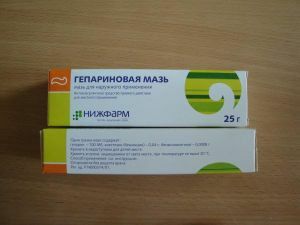 Every day advertising offers us a lot of medicines, but not all of them work effectively. And there are means that do not flash in bright videos on the screen and at the same time remain popular and take an important place in the first-aid kits of many families. One of these drugs is heparin ointment.
Every day advertising offers us a lot of medicines, but not all of them work effectively. And there are means that do not flash in bright videos on the screen and at the same time remain popular and take an important place in the first-aid kits of many families. One of these drugs is heparin ointment.
Heparin ointment belongs to the group of direct acting anticoagulants and is currently one of the best resorbants. In addition, the ointment has anti-inflammatory and anesthetic properties.
This drug contains sodium heparin, anesthesin( benzocaine), benzilnicotinate, which are active substances, as well as auxiliary elements such as glycerin, nipose, purified water, petrolatum, cosmetic stearin, peach oil.
The therapeutic properties of the ointment are due to the presence of active components. Heparin prevents clogging of blood clots, dilutes blood, and also has anti-inflammatory effect;anesthesin gives an analgesic effect; benzyl nicotinate expands the vessels of , which increases the effectiveness of heparin.
Contents
- Pharmacokinetics characteristic of
- Indications for use
- Contraindications for the use of heparin ointment
- Mechanism of action of the drug
- How to use ointments and dosage
- Overdose with
- Ointment
- Special instructions for use and precautions
- Interaction with other drugs
- Form
- How much is the drug
- Reviews of patients and doctors
- Pros and Cons of Medication
- Analogs
- Hepatrombin
- Lyoton
- Venitan
- Video: How to prevent varicose during pregnancy?
Pharmacokinetics characteristic of
Pharmacokinetics are the processes that occur with a drug when ingested.
In the process of applying the heparin ointment, the necessary amount of heparin is absorbed into the blood, which is then processed by the kidneys and removed from the body.
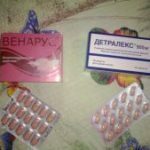 What can I drink if necessary Detralex or Venarus? What to choose cheaper or checked expensive medicine? The answers to these questions are in our article.
What can I drink if necessary Detralex or Venarus? What to choose cheaper or checked expensive medicine? The answers to these questions are in our article.
It may be worth choosing instead of a heparin ointment, its analogue of the lyoton gel, the price of which is slightly higher, but there are obvious advantages? The answer to this and many other questions is here.
Indications for use
Ointment is used for such diseases:
- Varicose veins .It should be noted that most ointments used in varicose veins include heparin. As is known, the main cause of varicose veins is a violation of blood circulation. In the initial stages, this disease manifests itself in swelling, redness of the affected area, there may appear "vascular asterisks".It is at this stage of the disease that heparin ointment will be effective, becauseit removes inflammation and improves blood circulation. The period of application is usually about two weeks.
- Thrombophlebitis .This disease is characterized by the formation of a thrombus in the vein and the onset of inflammatory processes on the walls of the vessel. Heparin ointment is also effectively used to treat thrombophlebitis. Its active components help to remove inflammation and promote blood clot resorption, and also prevent their re-formation. But you should be careful when applying the ointment, because active rubbing can trigger a thrombus rupture.
- Inflammation of veins ( postinjection and postinfusion phlebitis, periphlebitis).
- Hemorrhoids. This disease occurs as a result of thrombosis of the rectum veins, so for effective treatment it is important to eliminate the cause of hemorrhoids. This task is well handled by a heparin ointment, which not only removes inflammation and eliminates pain, but also helps to eliminate existing blood clots and does not allow the formation of new ones.
- Trophic ulcers .The active substances that make up the heparin ointment expand the blood vessels and increase the fluidity of the blood, as a result of which tissues receive more useful substances and oxygen. Such properties of the ointment contribute to the early healing of ulcers. But note, you can not apply the ointment directly to the wound, because this can cause bleeding.
- Lactation mastitis .Heparin ointment is rarely used in this situation, however, with inflammation of the breast in a nursing mother, the anti-inflammatory properties of the ointment can be useful.
- Lymphangitis .
- Elephant foot disease .
- Contusions, bruises, swelling .
Contraindications for the use of heparin ointment
- Breaking the integrity of the skin , ulcerative necrotic processes. Do not apply the ointment directly to the wound, because this can increase bleeding. In addition, the use of heparin ointment slightly reduces immunity, which can increase the risk of infection.
- Blood clotting disorder ( hemorrhagic diathesis, thrombocytopenia) and bleeding. Heparin ointment enhances fluidity of the blood, therefore it is impossible to use it with reduced blood coagulability, as well as with existing hemorrhages, including internal ones.
- Hypersensitivity to components of the preparation .Before using the ointment, it is best to test it on a small area of the skin.
- Also, heparin ointment is not assigned to for children under 14 years of .
Mechanism of action of the drug
As already mentioned, the heparin ointment, thanks to several active components, is a drug with complex action. After application to the skin, 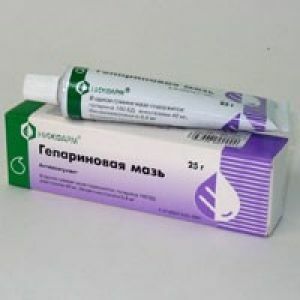 , every substance that is part of the ointment begins to perform its task.
, every substance that is part of the ointment begins to perform its task.
Benzylnicotinate expands the vessels and promotes better absorption of heparin.
Sodium heparin, in turn, penetrating the blood, activates the protein antithrombin III, which reduces blood clotting. Thus, thrombin activity is inhibited and the ability of platelets to connect and form thrombi deteriorates.
In addition, heparin reduces the ability of the blood to form the basis for thrombi - fibrin.
It is thanks to such properties that heparin eliminates formed thrombi and prevents their further appearance, promotes resorption of hematomas and relieves inflammation in the affected area.
Benzocaine acts as a local anesthetic and reduces pain in the affected area.
How to use ointments and dosage
We suggest that you read the instructions for the use of heparin ointment.
Heparin ointment is very simple and convenient to use.
It is applied to the affected area with a thin layer, after which it is distributed along it with cautious movements.
Usually used up to 1 gram of ointment per section about 5 cm in diameter.
To achieve the effect, the procedure should be carried out 2-3 times a day. The average course of treatment with heparin ointment is 3-7 days , however it can reach several weeks, for example, when treating large hematomas.
Features of application for various diseases:
- Thrombosis of hemorrhoids. Ointment is applied to the gasket, which should be applied to the thrombosed unit and fixed. It is also possible to use a tampon impregnated with heparin ointment, which should be inserted into the anus. The duration of treatment is usually 3-14 days.
- Varicose veins, thrombophlebitis. Do not use the ointment as a massage, you need to apply it very carefully, so as not to aggravate the disease. With varicose ointment you need to rub around the affected vein.
- Contusion. Do not apply the ointment directly after an injury, because this can increase bleeding. It is better to start using the ointment the day after the injury. To enhance the effect, you can apply a bandage over the ointment.
Overdose with
The danger of overdose is practically absent, since the active components are contained in a small volume, and when absorbed into the blood, their insignificant amount falls.
As a rule, the use of heparin ointment does not give side effects, but in some cases the drug can cause an allergic reaction to the skin( redness, rash, itching). During a prolonged course of treatment, an increased sensitivity to the components of the drug may occur, which also manifests itself in reddening of the skin, sensation of itching or burning, and other negative external reactions.
In this case, you should consult a doctor who will advise on how best to continue treatment.
Special instructions for use and precautions
Patients' reviews suggest that heparin ointment during pregnancy and during breastfeeding for women can be used short-term and only on the advice of a doctor. In the last trimester of pregnancy, the use of this agent is not recommended, because active components of the ointment can cause severe bleeding during labor.
The use of the drug has no negative effect on the ability to drive a vehicle, engage in activities that require high concentration.
Do not apply ointment on open wounds, blisters, mucous membranes and skin around the eyes.
Use only externally. If ingested, the drug may cause nausea and vomiting. If this happens, it is necessary to do a gastric lavage and continue the treatment according to the symptoms. It is recommended to consult a doctor before use.
Interaction with other medications
Not prescribed concomitantly with non-steroidal anti-inflammatory drugs( NSAIDs), other anticoagulants,these drugs enhance the effect of heparin ointment, as well as antihistamines, tetracyclines, weakening its effect.
Form
Heparin ointment is a white ointment with a yellowish tinge. Available in tubes of 10 and 25 grams.
Dosage form: for external use.
How much is the preparation
Price for heparin ointment depending on size tuba:
- tube 10 grams - about 30 rubles;
- tuba 25 grams - 40-80 rubles.
Patient and Physician Reviews
In its reviews, patients who use heparin ointment note its positive properties of in the treatment of varicose, hemorrhoids, bruises and bruises. 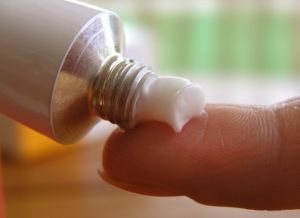
However, at the moment many of them are faced with the fact that "loses" in comparison with new drugs of the same pharmacological group.
In addition, patients who showed allergies, faced with the fact that antiallergic agents can not always neutralize the negative effect of the use of heparin ointment.
This is also said by doctors, arguing that ointment does not help all patients, and the application of the remedy does not always give the desired effect.
Pros and Cons of Medication
Of the advantages is note:
- low price, availability;
- ease of use;
- virtually no side effects;
- long shelf life( 3 years);
- complex impact;
- well resolves hematomas.
Disadvantages of heparin ointment:
- ointment is oily enough;
- can cause burning and redness of the skin;
- if there is an allergy, antiallergic agents do not always save;
- average level of efficiency.
Analogs
Analogues of heparin ointment are often better help and have fewer contraindications.
Hepatrombin
This drug has antithrombotic and anti-inflammatory properties. Produced in the form of ointments and gels.
Our readers recommend! For the treatment and prevention of varicose veins and hemorrhoids, our readers use the method first voiced by Malysheva. Having carefully studied it, we decided to offer it to your attention. Opinion of doctors. .. » It is used for varicose veins, thrombophlebitis, thrombosis, bruises, mastitis, lymphangitis.
Active components: Hepatrombin contains 3-5 times more heparin than in heparin ointment, allantoite, which has an anti-inflammatory effect, and dexpanthenol, which dilates blood vessels and improves absorption of the drug.
Contraindications and particulars of use are similar to heparin ointment.
Price: 130-400 rubles.
Lyoton
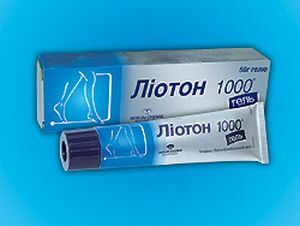 The drug with antithrombotic and anti-inflammatory properties. Produced in the form of a gel.
The drug with antithrombotic and anti-inflammatory properties. Produced in the form of a gel.
The inflammation of superficial veins, complications after operations on veins, hemorrhoids, superficial mastitis, hematomas is shown.
The active component in Lyoton is only one - Heparin, but it is contained in a high concentration.
Contraindications and particulars of use are similar to heparin ointment.
Price: 230-800 rubles.
Venitane
Pharmacological group - angioprotectors.
It is used in the treatment of diseases of veins, bruises, as well as as a means for the treatment and prevention of scarring.
Active components: beta-escin, which has venotonic and anti-inflammatory properties, and heparin.
Contraindications and particulars of use are similar to heparin ointment.
Price: 150-250 rubles.
Video: How to prevent varicose during pregnancy?
download. ..

 The drug with antithrombotic and anti-inflammatory properties. Produced in the form of a gel.
The drug with antithrombotic and anti-inflammatory properties. Produced in the form of a gel. 